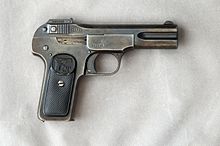FN M1900
| M1900/Browning No.1 | |
|---|---|
 Browning 1900 .32 ACP | |
| Type | Semi-automatic pistol |
| Place of origin |
|
| Production history | |
| Designer | John Browning[1] |
| Designed | 1896 |
| No. built | c. 700,000[1] |
| Variants | Modele 1899, Mle. 1900 |
| Specifications | |
| Mass | 625 g (1.378 lb)[1] |
| Length | 17.2 cm (6.8 in)[1] |
| Barrel length | 10.2 cm (4.0 in)[1] |
| Cartridge | .32 ACP (7.65×17mm Browning SR)[1] |
| Action | Blowback operated |
| Feed system | 7+1[1] |
| Sights | Fixed |
The FN Browning M1900 is a single action, semi-automatic pistol designed c. 1896 by John Browning for Fabrique Nationale de Herstal (FN) and produced in Belgium at the turn of the 20th century. It was the first production handgun to use a slide.
History[]

The design was presented to arms manufacturer FN Herstal in 1898, with production commencing the following year (then under the designation Modele 1899). In 1900, an improved design featuring primarily a shorter barrel and wider grips was introduced as the M1900. These designations were applied retroactively after FN began manufacture of other Browning pistol designs; initially the M1900 was marketed as simply the "Pistolet Browning" (Browning Pistol). Production ceased only 11 years later, with a total of about 700,000+ units having been produced.
United States President Theodore Roosevelt owned a mother of pearl-gripped M1900, which he regularly kept on his person and in his bedside drawer. It now resides in the NRA Firearms Museum.[2]
Eugen Schauman, a Finnish nationalist activist, assassinated the Governor-General Nikolay Bobrikov (the highest Russian authority in the Grand Duchy of Finland) with a Browning pistol on June 16, 1904, in Helsinki. The act was followed by spontaneous anti-Russian celebrations in the streets of Helsinki and after the 1917 independence Schauman was considered to be a national hero of Finland.[3]
An Jung-geun, a Korean-independence activist, assassinated the Resident-General of Korea Itō Hirobumi with this type of gun on October 26, 1909 in Harbin railway station.[4][5]
The pistol was popular in China from its introduction through World War II and was often copied and used as the basis for other designs.[6] State-run arsenals produced serialized production runs for warlord militias, and local craftsmen produced one-off handmade versions.

The is a copy of the M1900. Specimens examined by western authorities were marked with the date of 1964. A silenced variant was produced that featured a shortened slide to allow the threaded barrel to protrude far enough to attach the silencer.[7]
Ammunition[]
The weapon is chambered for the .32 ACP, also known as 7.65×17mm Browning SR, "SR" denotes semi-rimmed.
Synonyms[]
This model is known by several names, including:
- FN M1900
- FN Mle.1900
- Browning M1900
- Browning No.1
See also[]
References[]
- ^ a b c d e f g "FN / Browning M.1900 (Browning No.1) pistol (Belgium)". Modern Firearms. Retrieved 20 December 2012.
- ^ Jim Supica; Doug Wicklund; Philip Schreier (2012). The Illustrated History of Firearms. BOOKSALES Incorporated. p. 88. ISBN 978-0-7858-2989-8.
- ^ Zetterberg, Seppo (1988). Viisi laukausta senaatissa – Eugen Schaumanin elämä ja teko. Kustannusosakeyhtiö Otava. p. 246-247, 268, 281. ISBN 951-1-09266-9.
- ^ Lee, Sung Joo (2019). 우라웍스 (ed.). 안중근, 사라진 총의 비밀 : 이토 히로부미를 저격하고 빼앗긴 M1900을 찾아서. 청림출판. ISBN 9791155401569.
- ^ Lee, Jeong Hyun (24 October 2019). "안중근은 이토 히로부미를 어떻게 완벽히 저격했나". YTN. Retrieved 10 July 2021.
- ^ "Browning 1900". Forgotten Weapons. 3 October 2014. Retrieved 29 June 2021.
- ^ Hogg, Ian (1989). Jane's Infantry Weapons 1989-90, 15th Edition. Jane's Information Group. p. 44. ISBN 0-7106-0889-6.
- .32 ACP semi-automatic pistols
- FN Herstal firearms
- World War II infantry weapons of China
- 19th-century semi-automatic pistols
